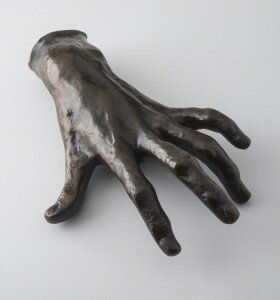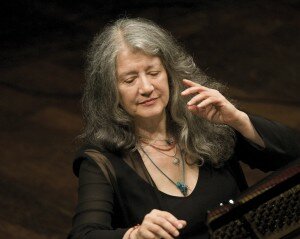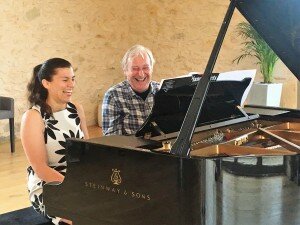
Pianist’s hand by August Rodin
Pianists do not devote their lives to their instrument simply because they like music….there has to be a genuine love simply of the mechanics and difficulties of playing, a physical need for the contact with the keyboard….inexplicable and almost fetishistic…– Charles Rosen
The members of my piano Meetup group, my students, the people who play street pianos – they are all “pianists” to me.
Beethoven: Piano Sonata No. 23 in F Minor, Op. 57, “Appassionata” – II. Andante con moto
Yet in researching this article, I discovered that many people believe the title “pianist” assumes a certain level of capability and should only be conferred upon a select few – professional concert pianists or those who have achieved an extremely high level of musical attainment.

Martha Argerich
Google isn’t much help either. Type in “Being a pianist” and the search throws up any number of “How to be a better pianist” sites, “top 10 worse things about being a pianist” or “15 steps to become an amazing piano player” (if only it were that easy!).
A confession: although I have played the piano for nearly two-thirds of my life, it wasn’t until I had secured my first professional qualification (a performance diploma, taken in my late 40s), that I felt I could justifiably describe myself as “a pianist”, rather than someone who “plays the piano”. When I started to give public concerts, sometimes for real money, I stopped feeling like I was playing at being a pianist, a fraudulent concert pianist.

Amateur pianists at La Balie, France
Stravinsky: Petrushka – I. Danse russe
“I play the piano” suggests a more casual relationship with the instrument, something one does occasionally, at weekends, on Sundays….Yet many of the amateur pianists I encounter display a passionate commitment to the instrument which borders on obsession, regardless of the level at which they play. These people are not dreaming of the stage at Wigmore or Carnegie Hall; no, they play and practise for a personal challenge and fulfillment, a sense of one’s own accomplishment, to be better than one was yesterday while working towards tomorrow, and the next day, and the next…..It’s addictive, constant and consistent, sometimes therapeutic, often frustrating, but always, always compelling….It’s founded on love, of the instrument and its literature, and it is this love which drives these people to practise, to take lessons, and to strive to improve their playing, cherishing precious moments in their busy lives to find time to spend at the piano.
It’s a state of madness. Unless you’re any good. Even then, you drive yourself half mad and waste precious time proving yourself to idiots who haven’t a clue – David, professional pianist
There’s a frustration with which many of us who play at an advanced level are familiar – that people don’t really understand or appreciate what we do, or how hard it is (“does it get easier as you get better?” a friend of mine asked me recently. “No“, I replied. “You just get more efficient at working out how to do it!“). I remember the parent of one of my students commenting admiringly that it was “amazing” how the music just “came out” of my fingers. “How do you do it?” she asked. I felt like asking her whether she had ever considered why her daughter, my student, was required to practise regularly…. Yet for audiences and onlookers the magic, the mystique, of the pianist is very potent, and to reveal too much about our craft and art would dispel that.
Frustration, physical pain and constant setbacks. Sadly it doesn’t seem to be a mantle I can take off though – it’s just what I am – Dave
It’s my passion, frustrating, challenging and rewarding every day – Teresa
It is the most important thing in my life, it makes me profoundly happy to play and teach this beautiful instrument and its wonderful repertoire. I never take it for granted. When I play, I am transported somewhere else beyond my music studio… – Caroline
It means I can be pro-active with the world of music, and not just a bystander – Terry
Being a pianist puts us in touch with a vast repertoire, a rich seam of creativity, and some of the finest music ever written, and still being written. By engaging with it, we bring these works to life, like a conservator or gardener, every time we play. It puts us in touch with emotions and sentiments which are common to us all; it reminds us of our humanity, yet also transcends the pedestrian, the every day. In this way, for many of us being a pianist is an escape: as a child, I regarded the piano as a playmate, a place where I could go to weave stories and set my imagination free. Why should that be any different when one reaches adulthood?
For all of us who play the piano – amateur or professional – being a pianist offers limitless possibilities in what we can create and experience.
The real question is – what would you be without the piano?





Thanks you so i want to be good musician or teacher of music like you
I remember reading that Arthur Rubinstein once said that what is important is your passion for music and that this passion is unrelated to your ability to play. In other words the “amateur” pianist’s passion is just as great as the most accomplished pianists.
This reminds me of Anthony Burgess’ 1980’s novel “The Pianoplayers” where if I remember correctly, live players who provided background music to silent films were just “piano players”, whereas concert hall “refinement” came from “Pianists”. It was a great book, really funny, and I’m sure it must have ended squarely on the side of “Pianoplayers”.
In real life I think it’s enough to say whether one is a “professional pianist” or an “amateur pianist”, with the understanding that not being paid does not mean any less passion for the instrument. It can sometimes also mean a surprising ability to play well, but perhaps only in a limited repertoire, whereas a pro should do very well in a wide range of styles. (Including perhaps, even silent movie accompanyment!)
In terms of ability, most of us know where we stand; it’s the same everywhere else e.g. a footballer and a pro footballer in competitive sport usually have markedly different abilities, yet the amateur is just as enthused about the game.
For me it means to learn to play Hammerklavier or Diabelli variations as they were the most beautiful dream of humanity.
No ever says “don’t shoot the pianist.” So it’s safer than being a piano player and therefore a worthy aspiration.